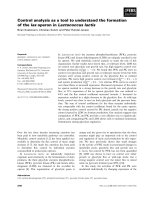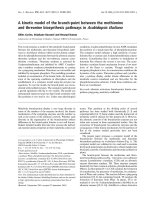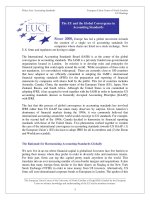The EU and the Global Convergence in Accounting Standards doc
Bạn đang xem bản rút gọn của tài liệu. Xem và tải ngay bản đầy đủ của tài liệu tại đây (77.13 KB, 6 trang )
Policy Area: Accounting Standards European Union Center of North Carolina
EU Briefings
Since 2000,
Europe has led a global movement towards
the creation of a single set of accounting standards for
companies whose shares are listed on a stock exchange. Now
U.S. firms and regulators are having to adapt.
The International Accounting Standards Board (IASB) is at the center of the global
convergence in accounting standards. The IASB is a privately funded non-governmental
organization located in London. Its mission is to develop rules and principles for
financial reporting that could apply around the world. While acceptance of these rules is
not mandatory, it is nevertheless widespread. There are currently close to 100 countries
that have adopted or are officially committed to adopting the IASB’s international
financial reporting standards (IFRS) for the preparation and reporting of financial
statements by companies with shares held by the public. This list of countries includes
Australia, Canada, China, the member-states of the European Union (EU), Japan, New
Zealand, Russia, and South Africa. Although the United States is not committed to
adopting IFRS, it has accepted to work together with the IASB in order to harmonize US
accounting standards (known as Generally Accepted Accounting Principles [GAAP])
with IFRS.
The fact that this process of global convergence in accounting standards has involved
IFRS rather than US GAAP has taken many observers by surprise. Given America’s
dominance of financial markets during the 1990s, it was commonly believed that
international accounting around the world would converge to US standards. For example,
in the second half of the 1990s, Canada decided to harmonize its financial reporting
standards with those of the United States. Two phenomena worked together to weaken
the case of the international convergence in accounting standards towards US GAAP: (1)
the European Union’s (EU) decision to adopt IFRS for all its members and (2) the Enron
and Worldcom scandals.
The Rationale for Harmonizing Accounting Standards Globally
We now live in an era where financial capital is globalized. Investors face few barriers to
putting their money where they prefer in order to diversify risks and maximize returns.
For their part, firms can tap this capital pretty much anywhere in the world. This
translates into an ever increasing number of cross-border mergers and acquisitions. It also
means that many foreign firms decide to list their shares on Nasdaq or the New York
Stock Exchange (NYSE) in order to raise money from US investors. Alternatively, US
firms sell euro-denominated corporate bonds to Europeans in London. The upshot of this
___________________________________________________________________________________
The European Union Center of the University of North Carolina at Chapel Hill is funded by the European
Union to advance knowledge and understanding of the EU and its member countries.
1
The EU and the Global Convergence in
Accounting Standards
Policy Area: Accounting Standards European Union Center of North Carolina
EU Briefings
globalization of financial capital for large and, increasingly, for medium-sized firms is
that their investor base is becoming ever more international.
The international mobility of capital and the internationalization of firms’ investor base
are creating pressures for accounting standards to be harmonized internationally.
Investors and firms need accurate and easily comparable financial information. For
investors, comparable information is necessary so that they do not have to incur the cost
of familiarizing themselves with financial reporting standards used in other countries or
of translating financial results from one set of standards to another in order to make them
comparable. For companies, harmonized accounting standards means that they do not
have to produce their financial statements according to many sets of rules in order to
satisfy the multinational nature of their investor base.
What is true for firms is also true for markets. The creation of integrated financial
markets for equity and corporate bond trading around the world requires accurate and
easily comparable financial information that investors can use in order to make proper
investment decisions. Otherwise, markets will remain fragmented as investors will tend
to favor companies of the same nationality, whose economic performance is easier to
assess because of their use of national accounting standards with which investors are
familiar. Because these informational costs force investors to put most, if not all, of their
capital in their country of residence, capital will not be allocated optimally across the
globe. In other words, investors will prefer investing in national companies rather than in
companies located in other countries, depriving themselves of investment opportunities
offered in the rest of the world as well as opportunities to diversify country risk. The end
result is a cost of capital that is higher than necessary.
When investors can compare companies’ performance more easily across borders
because of common accounting standards for financial reporting, then they spend less
time and money on analyzing and comparing companies’ financial statements. This
translates into a lower cost of capital demanded by investors.
The Emergence of US GAAP as the Global Accounting Standards in the 1990s
The increasing mobility of capital across borders initially favored the United States, and
especially New York, as the dominant center of international finance during the 1990s.
The United States had the largest pool of capital available to firms in the world. Its stock
markets were also the most liquid. Consequently, firms could generally raise capital at a
lower cost than elsewhere. This is why many foreign firms decided to list their shares in
New York, either on Nasdaq or NYSE. For instance, there were 26 EU companies listed
on the NYSE in 1990; the number had increased to 146 by 2001.
___________________________________________________________________________________
The European Union Center of the University of North Carolina at Chapel Hill is funded by the European
Union to advance knowledge and understanding of the EU and its member countries.
2
The Securities and Exchange Commission (SEC) requires those companies that list their
shares on a US stock exchange to report their financial information in accordance with
US GAAP. The objective is to protect American investors from misunderstanding
Policy Area: Accounting Standards European Union Center of North Carolina
EU Briefings
financial information prepared according to foreign standards. Foreign securities
regulators tended to follow similar policies up until the early 1990s. But as capital
became more mobile internationally, such policies became increasingly unsustainable.
As long as financial reporting standards remain national, companies and investors tend to
concentrate their financial transactions in few, large, and highly-liquid global markets
such as New York and London. This means that smaller securities exchanges are forced,
at a minimum, to follow the rules and standards of the dominant financial markets in
order to remain competitive. For example, many securities exchanges in the EU allowed
foreign firms to report their consolidated financial accounts according to US GAAP
rather than according to national accounting standards. This was seen as the only way to
compete in global capital markets.
For EU member state governments, this market-driven standardization as well as the
growing global importance of US securities exchanges threatened Europe’s position in
the world economy. The fears were that the European economy would become
increasingly dependent on US capital markets while the soon-to-be-introduced euro
would be unable to rival the US dollar as a reserve currency.
The EU’s Response to the Economic Challenge Posed by the US
The fact that an increasing number of large European companies were raising capital in
the United States while EU securities exchanges were allowing firms to use US GAAP
sent alarms ringing in Brussels and national capitals across continental Europe. The
common fear was that this market-based standardization of accounting rules would lead
to American accounting standards becoming the common standards around the world.
In response, European Union leaders believed that an integrated market for financial
services was necessary for the EU to remain competitive against US capital markets.
However, such an integrated financial market required a common set of accounting
standards for the entire EU. Although attempts had been made in the 1970s and 1980s to
harmonize financial reporting standards across the EU, these efforts had proved
ineffective, allowing too many exceptions. The EU was able to generate some equality
across of standards across the Union, owing to mutual recognition, but there was in effect
no comparability.
If the EU wanted to maintain its competitive position in financial services vis-à-vis the
United States, it was clear that the only comparable set of accounting standards used in
Europe could not be US GAAP. Therefore, a new set of financial reporting standards had
to be promoted by the EU.
___________________________________________________________________________________
The European Union Center of the University of North Carolina at Chapel Hill is funded by the European
Union to advance knowledge and understanding of the EU and its member countries.
3
The EU’s choice was really between devising new “European” accounting standards and
adopting those developed by the IASB. Given the mitigated success that it had
experienced in trying to harmonize standards across Europe, it was clear that creating a
Policy Area: Accounting Standards European Union Center of North Carolina
EU Briefings
new set of common EU accounting standards through a European Accounting Standards
Board would prove impossible. The basic philosophies underlying the various national
accounting rules inside the EU were simply too different. Standards in countries like the
Netherlands and the United Kingdom were devised with investors in mind and based on
shared principles, while those in countries like France, Germany, and Italy were focused
on taxation with detailed prescriptive rules.
The IASB’s existing international financial reporting standards were the most sensible
choice for the European Union, both economically and politically. Indeed, EU leaders
even hoped to influence the international convergence of accounting reporting standards
such that IFRS would become the commonly-applicable principles and rules across the
world. This would give them a head start over the United States in adapting to the new
norms and it would also ensure that the common rules were something other than US
GAAP.
This strategy took off at the European Council summit in Lisbon in March 2000. There
the EU member states committed themselves to a process of economic reforms that
would make the EU the world’s most dynamic and competitive knowledge-based
economy by 2010. One important element of the Lisbon Strategy was to fully integrate
the EU’s financial markets, which in turn required the adoption of a common set of
accounting standards: IFRS.
The Lisbon commitment has been much derided for failing to trigger deep market-
structural reforms. Meanwhile, European progress in moving toward a common set of
accounting standards has been largely overlooked. Since January 1, 2005, all companies
whose shares are listed on a stock exchange in the EU have to produce their consolidated
financial statements according to the standards promulgated by the IASB rather than
according to national ones. This means that accounting rules (for listed companies) have
now been standardized across 27 member states. The EU is now the largest jurisdiction in
the world to make IFRS the only applicable financial reporting rules for publicly-listed
companies.
By making IFRS its official accounting standards, the EU provided a clear and distinct
alternative to US GAAP for international firms and investors. It also reinforced the
IASB’s role as the focal point for the convergence of international accounting standards.
This led other countries to follow suit. In late February 2005, 41 countries in addition to
EU member states had decided to require the use of IFRS for domestically-listed
companies, including such Anglo-Saxon heavyweights as Australia, New Zealand and
South Africa.
IFRS as an Alternative to US GAAP
___________________________________________________________________________________
The European Union Center of the University of North Carolina at Chapel Hill is funded by the European
Union to advance knowledge and understanding of the EU and its member countries.
4
The EU’s adoption of IFRS was a major shift in the international convergence in
accounting standards. Nevertheless, it is not clear that such convergence would have
taken place without the accounting scandals at Enron and MCI Worldcom in 2001-2002.
Policy Area: Accounting Standards European Union Center of North Carolina
EU Briefings
These scandals undermined investors’ confidence in the superiority of US GAAP vis-à-
vis other financial reporting standards used around the world. Moreover, the fact that
accounting fraud took place on such a scale even while US GAAP’s detailed rules had
been followed suggested that the problem with US GAAP is fundamental.
A major difference between the IFRS promoted by the EU and the US GAAP is that the
IFRS is based on shared principles while the US GAAP is based on precise rules. Once it
became clear that US rules could be followed to the letter but not respected in their spirit,
this made a principles-based, as opposed to a rules-based, approach more attractive to
investors. Although less precise, accounting standards based on principles make it more
difficult for accountants to exploit loopholes in the wording of the standards. By applying
standards in accordance with general accounting principles, financial accountants have no
choice but to follow the spirit of the rules. In turn, the fact that IFRS are based on
principles rather than detailed rules contributed to their increasing legitimacy worldwide.
The Sarbanes-Oxley Act of 2002, which was a direct result of the Enron and Worldcom
scandals, recognized the validity of IFRS and principles-based accounting standards. As a
result, it enjoined the SEC and the U.S. Financial Accounting Standards Board (FASB) to
take greater account of what was happening internationally when setting financial
reporting standards for the United States.
Recognizing the international shift towards IFRS and responding to Congressional
pressures via the Sarbanes-Oxley Act, the SEC and FASB decided to accord more
importance to IFRS. Following a meeting between the FASB and the IASB in September
2002, a joint memorandum of understanding was signed (now known as the Norwalk
Agreement) whereby the two standard-setters agreed to coordinate their work programs
so as to eliminate differences between US GAAP and IFRS in the medium term. The EU
wished that once this convergence was achieved the SEC would remove its requirement
for foreign firms to reconcile their financial statements with US GAAP. The SEC has
indicated that it would be in a position to do so by 2009 if all goes according to plan.
Christopher Cox, the SEC chairman, has even mentioned that American firms could be
allowed to file their financial statements according to IFRS, should they want to because
they operate globally and their investor base is equally international.
The EU Seeks More Influence at the IASB
The victory of the Europe Union in its efforts to set the pace of global convergence on
international financial reporting standards was only partial. The EU succeeded in
ensuring that convergence would focus on international (and not specifically US)
standards, but it did not win control over how these international standards would be set.
Hence, while formal collaboration between the FASB and the IASB reinforced the notion
that IFRS were the focal point for convergence, the United States still had more influence
over IASB standard setting than the EU.
___________________________________________________________________________________
The European Union Center of the University of North Carolina at Chapel Hill is funded by the European
Union to advance knowledge and understanding of the EU and its member countries.
5
Policy Area: Accounting Standards European Union Center of North Carolina
EU Briefings
The new challenge for the European Union is to find a way to be heard in the process of
setting international accounting standards. At the moment, discussion hinges on how
different interests are represented at the international level. The EU wants greater
geographical representation, knowing that it would mean more of a voice for its member
states. The United States, however, prefers to maintain the IASB’s independence from
political meddling, which means that they oppose allocating seats on the IASB according
to geography.
The complicated nature of European integration gives the EU something of an advantage.
Although EU leaders have agreed to use IFRS, that agreement at the EU level is not
directly binding on the various member states. Instead, member-state representatives,
securities regulators and business interests must endorse any changes to the international
financial reporting standards before these can be implemented at the national level.
Moreover, since the European Union is the IASB’s largest market, member state
acceptance of changes to the IFRS has become a litmus test for the legitimacy of the
process of setting accounting standards at the international level. By implication, the
IASB must take account of the EU’s concern during its standard-setting process, and so
the IASB and its trustees did increase Europe’s representation in its various bodies.
This increased European influence does not mean that the IASB no longer considers the
United States’ opinion, but rather that the EU is now treated with at least equal standing.
In a 2006 speech to the European Parliament, Sir David Tweedie, the IASB chairman,
said: “It was the decision of the European Union to adopt IFRS that dominated the
IASB’s initial work program. We changed our priorities and timetable from what they
would otherwise have been only to accommodate the European decision to adopt IFRSs
in 2005.” And increasingly, it is U.S. firms who will have to adapt.
Summary
The internationalization of capital and its increasing mobility created the pressures for the
global convergence in accounting standards. At first, it seemed that US GAAP would act
as the focal point for this convergence. As a result, the EU feared that the United States
and its dollar would come to dominate not only global financial reporting standards but
international capital markets as well. These fears prompted the EU to push for the
completion of a fully integrated market for financial services across Europe in order to
provide an alternative to US markets. Creating a set of common accounting standards for
the EU was part of this strategy. Since history had shown that creating a new set of
standards specifically for Europe was impossible, because of incompatible accounting
philosophies between the member states, the decision was taken to adopt IFRS in the EU
by 2005. This decision, in combination with the Enron and Worldcom accounting
scandals in the US, provided the needed impetus to make IFRS the set of accounting
standards towards which countries around the world would now converge. U.S. firms
will have to adapt to this new reality.
___________________________________________________________________________________
The European Union Center of the University of North Carolina at Chapel Hill is funded by the European
Union to advance knowledge and understanding of the EU and its member countries.
6









